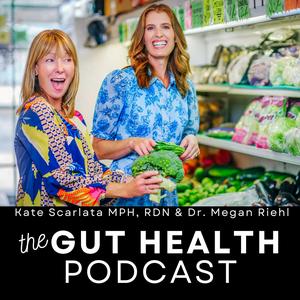Fiber isn’t one-size-fits-all and for some people, more isn’t better. In this episode, we explore why most people under-eat fiber, why certain fibers can worsen symptoms, and how to personalize intake in a way your body can actually tolerate. Dr. Heather Armstrong shares emerging insights on fiber function, microbiome capacity, and practical strategies for going low and slow. We also unpack new science explaining why fiber supports gut health in some individuals, while triggering issues in others with reduced fermentative activity.
In this episode, we discuss:
• The fiber gap, health risks, and minimum intake targets
• How solubility, viscosity, and fermentability guide fiber choice
• Matching fiber types to IBS, diarrhea, and constipation
• Why whole foods matter more than isolates
• Citrus peel pectin and simple kitchen hacks
• Why “low and slow” dosing reduces gas and pain
• How long microbiome changes and symptom relief actually take
• When fiber supplements help (and when they don’t)
• Individualized fiber needs in IBD (and implications for IBS, MS, and liver disease)
• Why dietitians are essential for precision nutrition
This episode is especially relevant if you’ve been told to “just eat more fiber”—and it didn’t go well.
Learn more about Dr. Heather Armstrong's novel research:
Gut feeling: new test and precision diet could boost health for people with IBD. U of A research team in clinical trials for their innovative AI-powered tool that could reduce inflammation by “rewiring” the gut microbiome.
References:
Ramezani F, Pourghazi F, Eslami M, et al. Dietary fiber intake and all-cause and cause-specific mortality: An updated systematic review and meta-analysis of prospective cohort studies. Clin Nutr. 2024
Chang SC, Cassidy A, Willett WC, Rimm EB, O'Reilly EJ, Okereke OI. Dietary flavonoid intake and risk of incident depression in midlife and older women. Am J Clin Nutr. 2016
Armstrong HK, Bording-Jorgensen M, Santer DM, et al. Unfermented β-fructan Fibers Fuel Inflammation in Select Inflammatory Bowel Disease Patients. Gastroenterology. 2023
Armstrong H, Mander I, Zhang Z, Armstrong D, Wine E. Not All Fibers Are Born Equal; Variable Response to Dietary Fiber Subtypes in IBD. Front Pediatr. 2021
Gao J, Lee AA, Abtahi S, et al. Low Fermentable Oligosaccharides, Disaccharides, Monosaccharides, and Polyols Diet Improves Colonic Barrier Function and Mast Cell Activation in Patients With Diarrhea-Predominant Irritable Bowel Syndrome: A Mechanistic Trial. Gastroenterology.
This episode is sponsored by Activia.
Learn more about Kate and Dr. Riehl:
Website: www.katescarlata.com and www.drriehl.com
Instagram: @katescarlata @drriehl and @theguthealthpodcast
Order Kate and Dr. Riehl's book, Mind Your Gut: The Science-Based, Whole-body Guide to Living Well with IBS.
The information included in this podcast is not a substitute for professional medical advice, examination, diagnosis or treatment. Always seek the advice of your physician or other qualified health care provider before starting any new treatment or making changes to existing treatment.


